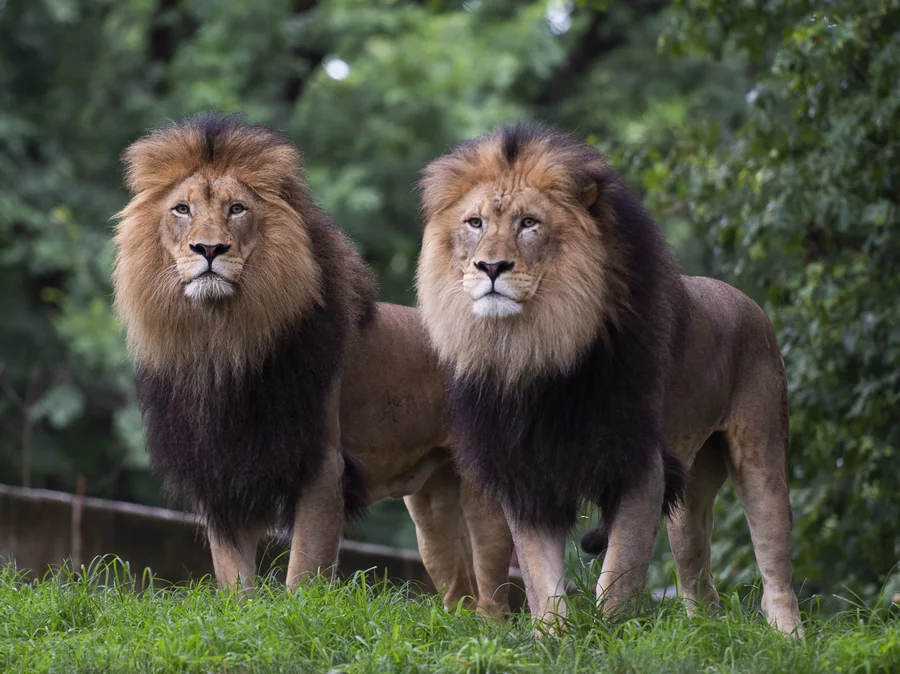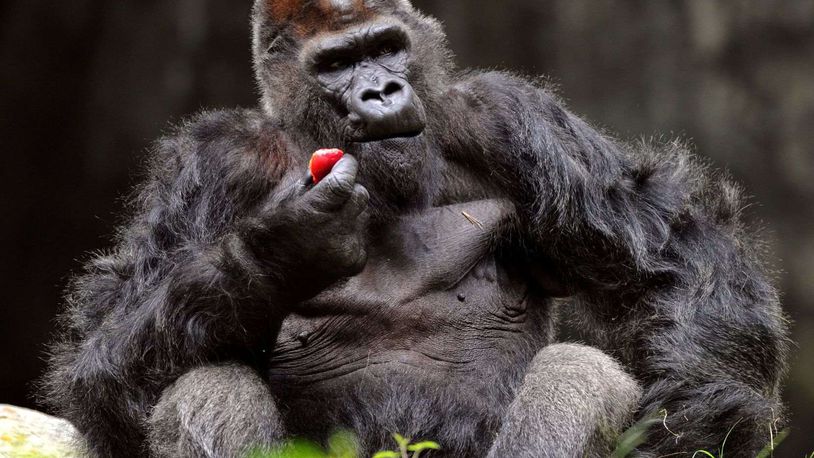9 Lions And Tigers At The National Zoo Are Being Treated For COVID
By SHARON PRUITT-YOUNG
9/17/2021

Andrew Caballero-Reynolds/AFP via Getty Images
Humans aren’t the only ones who have to worry about COVID-19. A number of lions and tigers at the Smithsonian’s National Zoo in Washington, D.C., are now being treated for the virus.
Six African lions, a Sumatran tiger, and two Amur tigers have tested presumptive positive for COVID-19 and are undergoing treatment, the zoo said in a news release Thursday.
Zookeepers first noticed last week that the animals were displaying symptoms including decreased energy and appetite, and coughing and sneezing. The animals are now being treated with anti-inflammatories, anti-nausea medication and antibiotics, the latter of which is intended to address a likely secondary bacterial pneumonia, the zoo said.
The affected animals are not required to quarantine, and the public is not at risk due to the general lack of access zoo visitors have to animals in their enclosures, the zoo said.
How the big cats contracted the virus is unclear. The zoo said its investigation did not yield answers as to how the virus may have spread to the animals, but it noted that all staff who may have had contact with the animals are required to wear a mask indoors.
The Centers for Disease Control and Prevention has has said that it is possible for humans to transmit the virus to animals through close contact, but the risk of animals spreading the virus to humans is low.
The National Zoo isn’t the only facility dealing with sick animals. At Zoo Atlanta, 18 out of 20 western lowland gorillas have contracted COVID, likely from an asymptomatic zoo worker. Like the big cats at the National Zoo, the gorillas displayed symptoms including decreased appetite and coughing.
Zoos, however, are fighting back. Seventy zoos and other animal conservation sites have received donations of the COVID-19 vaccine to administer to some of their animals, The Washington Post reported.
More than a dozen gorillas at Zoo Atlanta diagnosed with COVID-19
The gorillas are among other primates infected in zoos elsewhere
By Bo Emerson, The Atlanta Journal-Constitution
9/12/2021
Zoo Atlanta is treating 13 western lowland gorillas who have tested positive for COVID-19.
The gorillas were tested after they demonstrated mild coughing, runny noses and loss of appetite. Atlanta’s animal handlers took fecal samples and nasal and oral swabs from the gorillas and sent the samples to the Athens Veterinary Diagnostic Laboratory at the University of Georgia, which returned a presumptive positive result.
Atlanta is waiting for confirmation from the National Veterinary Services Laboratory in Ames, Iowa, which also received samples.

Atlanta’s gorillas are apparently the second group of great apes infected by the coronavirus, according to Dr. Sam Rivera, senior director of animal health at Zoo Atlanta.
A troop of eight gorillas at the San Diego Zoo Safari Park were treated for the virus in January. One San Diego silverback received an experimental antibody regimen, and all recovered.
The 20 gorillas at Zoo Atlanta are divided into four troops, and members of every troop have shown evidence of infection. Rivera said it is likely that the virus made its way into the gorilla population from an animal care staffer who was asymptomatic when she came to work, but was tested later and was shown to be positive.
That staffer had already been vaccinated and was wearing the protective gear that has long been part of Zoo Atlanta protocol, including gloves, mask and a face shield.
There is no requirement that members of the Zoo Atlanta staff get vaccinated, though a high percentage of the staff has been vaccinated, said spokesperson Rachel Davis.
Because the gorillas live together in close proximity, it is impossible to isolate the affected members, said Rivera. All will be tested. As the affected gorillas recover from their symptoms, the staff plans on vaccinating the gorilla population with the Zoetis vaccine, which was developed for veterinary use and had been used at the San Diego zoo on its ape population.
Zoo Atlanta has already vaccinated its Bornean and Sumatran orangutans, its Sumatran tigers, its African lions and its clouded leopard.
Atlanta’s veterinary team is treating some of the gorillas at risk of serious complications with monoclonal antibodies, starting with the most senior members.
Those include Ozzie, who, at 60, is the oldest male gorilla in captivity. Rivera said Ozzie is showing mild symptoms. “We don’t feel that we’re out of the woods,” he added. “We’re taking it on a day by day basis.”
Humans are known to infect animals, but the distances between visitors to the zoos and the apes would make animal-to-human transmission extremely unlikely. The CDC says animals don’t play a significant role in spreading COVID to humans.
Other zoos have begun vaccinating at-risk animals, including the Detroit Zoo, which announced plans to vaccinate its gorillas, chimpanzees, tigers and lions.
COVID-19 has been known to infect tigers, lions, mink, snow leopards, cougars, dogs and domestic cats.
Joint CDC and FDA Statement on Johnson & Johnson COVID-19 Vaccine
The following statement is attributed to Dr. Peter Marks, director of the FDA’s Center for Biologics Evaluation and Research and Dr. Anne Schuchat, Principal Deputy Director of the CDC
For Immediate Release: April 13, 2021
Statement From: Director – Center for Biologics Evaluation and Research (CBER)
Peter Marks M.D., PhD.
As of April 12, more than 6.8 million doses of the Johnson & Johnson (Janssen) vaccine have been administered in the U.S. CDC and FDA are reviewing data involving six reported U.S. cases of a rare and severe type of blood clot in individuals after receiving the J&J vaccine. In these cases, a type of blood clot called cerebral venous sinus thrombosis (CVST) was seen in combination with low levels of blood platelets (thrombocytopenia). All six cases occurred among women between the ages of 18 and 48, and symptoms occurred 6 to 13 days after vaccination. Treatment of this specific type of blood clot is different from the treatment that might typically be administered. Usually, an anticoagulant drug called heparin is used to treat blood clots. In this setting, administration of heparin may be dangerous, and alternative treatments need to be given.
CDC will convene a meeting of the Advisory Committee on Immunization Practices (ACIP) on Wednesday to further review these cases and assess their potential significance. FDA will review that analysis as it also investigates these cases. Until that process is complete, we are recommending a pause in the use of this vaccine out of an abundance of caution. This is important, in part, to ensure that the health care provider community is aware of the potential for these adverse events and can plan for proper recognition and management due to the unique treatment required with this type of blood clot.
Right now, these adverse events appear to be extremely rare. COVID-19 vaccine safety is a top priority for the federal government, and we take all reports of health problems following COVID-19 vaccination very seriously. People who have received the J&J vaccine who develop severe headache, abdominal pain, leg pain, or shortness of breath within three weeks after vaccination should contact their health care provider. Health care providers are asked to report adverse events to the Vaccine Adverse Event Reporting System at https://vaers.hhs.gov/reportevent.html.
CDC and FDA will provide additional information and answer questions later today at a media briefing. A recording of that media call will be available on the FDA’s YouTube channel.
The FDA, an agency within the U.S. Department of Health and Human Services, protects the public health by assuring the safety, effectiveness, and security of human and veterinary drugs, vaccines and other biological products for human use, and medical devices. The agency also is responsible for the safety and security of our nation’s food supply, cosmetics, dietary supplements, products that give off electronic radiation, and for regulating tobacco products.
###
Six Spaces Home Staging

Contact: Hongliang Zhang
Tel: 571-474-8885
Email: zhl19740122@gmail.com
WHO recommends follow-up care, low-dose anticoagulants for COVID-19 patients
26 January 2021
WHO recommends that patients who have COVID-19 – both confirmed and suspected – should have access to follow-up care if they have persistent, new or changing symptoms.
This is one of the recommendations made by WHO in revised clinical management guidelines.
Evidence was gathered on the post COVID condition, so-called ‘long COVID’, where people who have recovered from COVID-19 continue to have longer-term issues like extreme fatigue, persistent cough and exercise intolerance.
Understanding this condition is one of WHO’s priority areas of work. In February 2021, WHO will organize a series of consultations to reach consensus on a description of this condition and its subtypes, and case definitions. This scientific understanding will inform the name of the condition. The consultations will include a broad range of stakeholders, including patient groups.
For COVID-19 patients at home, WHO suggests the use of pulse oximetry to measure oxygen levels in the blood. This needs to be coordinated with other aspects of home care, such as education for the patient and care provider and regular follow-up of the patient.
For hospitalized patients, WHO suggests the use of low dose anticoagulants for preventing the blood clots forming in blood vessels (thrombosis).
For hospitalized patients who are taking supplemental oxygen (including high-flow nasal oxygen) or non-invasive ventilation, WHO suggests positioning patients on their stomachs to increase oxygen flow (awake prone positioning).
The guidelines also include recommendations on the use of care bundles to systematize care provision for COVID-19 patients, as well as a recommendation to favour clinical judgement over models in making decisions for the patient’s care.
The recommendations were made by an independent panel of experts, the Guideline Development Group, on the basis of detailed rapid reviews of all available evidence.
The guidelines are a living document, updated regularly as more data becomes available.
世卫不建议接种莫德纳疫苗:应防止接种者出现过敏性休克
来源:海外网
2021年01月27日
海外网1月26日电 世界卫生组织专家组对莫德纳新冠疫苗mRNA-1273的数据进行评估后,26日发布了该疫苗的暂行使用建议;世卫组织将于2月底就是否将该疫苗纳入紧急使用清单作出决定。
据俄罗斯卫星通讯社26日消息,世卫组织免疫战略咨询专家组1月21日开会评估了莫德纳新冠疫苗mRNA-1273Ⅲ期临床试验的初步数据。考虑到接种这款疫苗后可能出现过敏反应,世卫组织专家建议只在能防止接种者出现过敏性休克的条件下提供接种。专家组不建议孕期妇女接种mRNA-1273,除非她们属于高风险人群(比如医疗工作者)。专家组指出,鉴于目前疫苗不足,加上没有证据表明疫苗能降低新冠病毒传播风险,不建议为旅行者优先接种。
据新华社早前报道,美国疾病控制和预防中心22日发布的一份报告显示,截至1月10日,全美共有4041396人接种了第一剂美国莫德纳公司研发的新冠疫苗,共报告了1266起不良反应事件,其中包括10起过敏反应。美疾控中心介绍,过敏反应是危及生命的严重不良反应,通常在接种疫苗后几分钟至几小时内发生。这10起被确认为过敏反应,其中9起发生在接种后15分钟之内,1起发生在接种后45分钟;108起可能为包括过敏反应在内的严重不良反应事件,需要进一步核查。
美国食品和药物管理局于2020年12月18日批准了莫德纳新冠疫苗的紧急使用授权申请。这是继美国辉瑞制药有限公司与德国生物新技术公司联合研发的新冠疫苗之后第二款获批在美紧急使用的新冠疫苗,被允许用于18岁及以上人群,共接种两剂,间隔1个月。(海外网 侯兴川)



